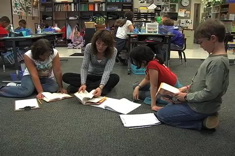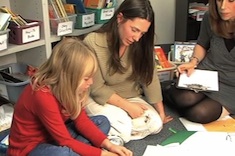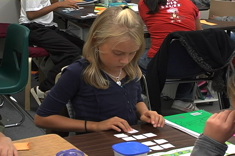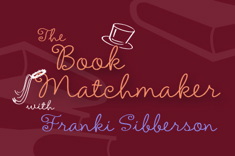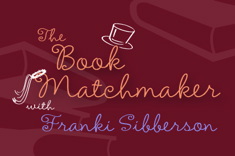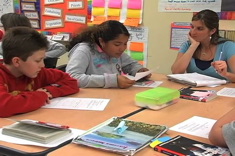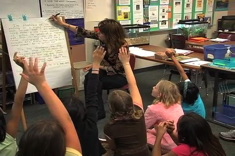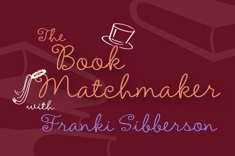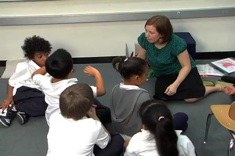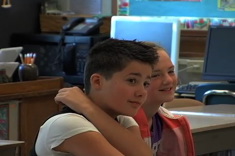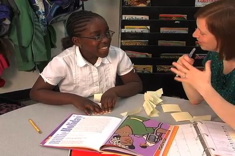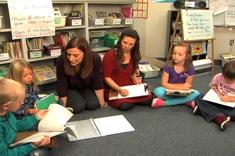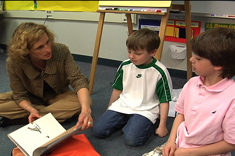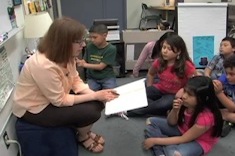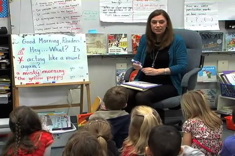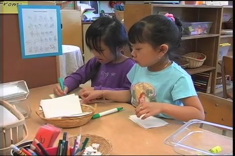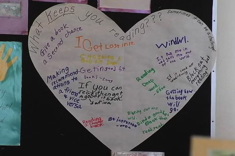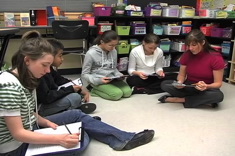Videos
Here is where you’ll find all the latest videos from our contributors. These videos are all captured in classrooms with crews using multiple cameras during regularly scheduled reading and writing workshops.
Latest Content
Launching a Book Club in 4th Grade
In this video from Andrea Smith’s 4th grade classroom, students get organized for a small group author study of Andrew Clements.
Listen In: Magnifying a Moment in Writing
Sometimes using a prop can help young students understand a revision strategy. Heather Rader helps second-grader Sammi understand how to “magnify” a moment when revising her writing.
Book Matchmaker: Texts for an Advanced First Grader
Joan is a first-grade teacher who has one reader in mind – a student who is reading well above grade-level expectations. Franki Sibberson has many intriguing book suggestions to help her.
6th Grade Word Sort
In this six-minute video, Pam Pogson leads an open word sort with her 6th grade students.
Book Matchmaker: Intermediate Read-Alouds
Franki Sibberson shares some of her favorite read-alouds for the intermediate grades.
Second-Grade Punctuation Conference
Beth Lawson confers with a second grader, assisting as she works on her punctuation skills.
Book Matchmaker: Graphic Novels for a 6th Grader
Franki Sibberson has graphic novel suggestions for 6th grade girls.
Guiding a Struggling Middle School Book Club
What do you do about those book clubs that just don’t jell in your middle school classroom? Katie Doherty demonstrates how she guides a struggling group of sixth graders, helping them reflect and converse together.
Frogs as Learning Ambassadors Part 2: Literary Nonfiction in 4th Grade
Andrea Smith explains how the classroom environment influences instruction in the second installment of this video series.
Book Matchmaker: 5th Grade English Language Learners
Robin Heist is an elementary teacher looking for books for her older English language learners who are reading below grade-level expectations.
Status of the Class and Monitoring Behavior
In this early year video from Beth Lawson’s second-grade classroom, Beth uses a writing status-of-the-class time to help students monitor their behavior, using peers as role models.
The Sponge Summary Lesson Part 1
In this sequence of videos, Heather teaches a fourth-grade class, using the analogy of a sponge to explain how summaries work. In this first video excerpt, Heather reviews the work the class has already done on understanding the attributes of good summaries.
Conferring: Stretching Words
In this conference with a second grader, Beth Lawson uses a visual aid and a hand motion to help a young English language learner understand the concept of stretching words in writing.
The Sponge Summary Lesson Part 2
In this sequence of videos, Heather teaches a fourth-grade class, using the analogy of a sponge to explain how summaries work. In this second video, Heather presents the powerful analogy of a sponge for summarizing.
Scaring Up Better Narratives Part I
Just before Halloween, Aimee Buckner leads a lesson on brainstorming topics in writer's notebooks using the mentor text Some Things Are Scary. In this first installment of a three-part series, Aimee reads the book and models her own thinking process and use of a writer's notebook.
The Sponge Summary Lesson Part 3
In this sequence of videos, Heather teaches a 4th grade class, using the analogy of a sponge to explain how summaries work. In this third video, Heather and students cull down a text into the important points needed for a summary.
Sticky Notes to Determine Importance
In this conference from Beth Lawson’s third-grade classroom, the focus is on the skill of determining importance in texts. Beth helps Sephina integrate sticky notes into her strategic reading of the book The Blues Singers.
Scaring Up Better Narratives Part 2
Just in time for Halloween, Aimee Buckner leads a lesson on brainstorming topics in writer's notebooks using the mentor text Some Things Are Scary. In this second installment of a three-part series, Aimee continues to confer with students and helps everyone refine potential writing topics in their notebooks.
Book Matchmaker: Teaching Theme in the Intermediate Grades
Students need strong mentor texts for understanding the concept of theme. Franki Sibberson shares many of her favorites in this Book Matchmaker.
The Sponge Summary Lesson Part 4
In this sequence of videos, Heather Rader teaches a 4th grade class, using the analogy of a sponge to explain how summaries work. In this fourth video, Heather and students discuss their summaries in progress
Inferring and Synthesis: Conferring Over Series Books
Beth Lawson shows how to get the most from a conference about series books in 3rd grade. Inferring and synthesis are discussed, as well as the use of written notes for making meaning from texts.
Voila! Best Writing and Entry Slips in Second Grade
The word voila in French literally means “see there.” Linda Karamatic puts time and reflection into creating a binder, or “voila book,” that will ease the bulging writing workshop folders and preserve the best of her second-grade students’ writing.
Teaching Stamina Strategies to First Graders
Tammy Mulligan works with two seven-year-olds to teach them strategies for building reading stamina.
Graphic Organizer for Mystery Writing
Beth Lawson talks with her 4th graders about the elements of a good mystery, and shares a graphic organizer to help them develop realistic characters and themes.
Book Matchmaker: Texts for 5th Grade English Language Learners
Finding high interest books for English language learners in the upper elementary grades can be a challenge. Franki Sibberson shares some of her favorites.
Linking Morning Message, Poetry, and Word Learning
Second-grade teacher Linda Karamatic has been starting her morning with a message for years. The morning message is just one part of her daily opening that reinforces community.
Preschool Writing Center
In this video from Melissa Kolb’s preschool classroom, children work in the writing center. Melissa explains how she routinely changes the supplies in the center to spark interest in students and make connections to their experiences.
Drawing to Learn: Conferring with Kyle
In this conference with six-year-old Kyle, Ruth Shagoury listens to him explain the stories and meaning behind his drawings during writer's workshop. Kyle's first language is Vietnamese, though English is also spoken in the home.
Connecting Students, Wall Charts, and Reading
In this conference with third-grade student Jeffrey, Beth Lawson helps this young reader think through the importance of developing stamina to get through the first 50 pages of a book.
“The Wrath of Guess Jeans”: Reading, Writing, and Cliques in Middle School
In this first video in a three-part series, Katie Doherty leads her 6th graders through a response activity. The text they are reading was written by a middle school student over a decade ago, and its themes of popularity and belonging still ring true for students.
Browse Content By
Type
Category
- Assessment Tools
- Big Fresh Archives
- Booklists
- Choice Numeracy
- Classroom Design
- Common Core
- Community Building
- Conferring
- Content Literacy
- Digital Literacy
- English Language Learners
- Equity
- Family Relations
- Free Samples
- Guiding Groups
- Leadership
- Literacy Coaches
- Mentor Texts
- Minilessons
- New Teacher Mentors
- Podcasts
- Poetry
- Quote Collections
- Reading Strategies
- Self Care
- Struggling and Striving Learners
- Talking and Listening
- Teacher Study Groups
- Teaching Reading
- Teaching Writing
- Word Study and Vocabulary
Author
- Melissa Quimby
- Nawal Qarooni
- Gwen Blumberg
- Julie Cox
- The Lead Learners
- Hannah Tills
- Josie Stewart
- Ruth Metcalfe
- Mallory Messenger
- Becca Burk
- Jodie Bailey
- Vivian Chen
- Mary Brower
- Tiffany Abbott Fuller
- Stephanie Affinito
- Ruth Ayres
- Leigh Anne Eck
- Heather Fisher
- Shari Frost
- Julie Johnson
- Suzy Kaback
- Gigi McAllister
- Shirl McPhillips
- Melanie Meehan
- Cathy Mere
- Debbie Miller
- Tara Barnett and Kate Mills
- Tammy Mulligan
- Dana Murphy
- Bitsy Parks
- David Pittman
- Brenda Power
- Heather Rader
- Matt Renwick
- Mandy Robek
- Christy Rush-Levine
- Gretchen Schroeder
- Jen Schwanke
- Brian Sepe
- Katherine Sokolowski
- Stella Villalba
- Jennifer Vincent
Grade Level
Choice Literacy Membership
Articles
Get full access to all Choice Literacy article content
Videos
Get full access to all Choice Literacy video content
Courses
Access Choice Literacy course curriculum and training

